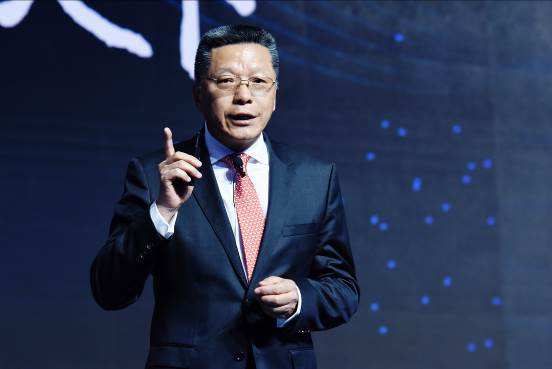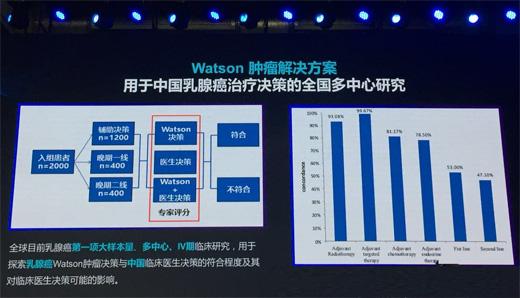On April 11th, IBM held a 2018 IBM THINK Forum (China) in Beijing entitled "Thinking about Promise, Going Almost, Going to the World". In this forum, IBM said that with the acceleration of big data , artificial intelligence technology and business innovation, we will enter the era of "Watson's Law", ushered in the third exponential growth after semiconductor and PC, Internet. Smart companies that are good at using digital intelligence technology and have exponential learning capabilities will take the lead in this era and even become the next industry giant. As the world's leading cognitive solutions and cloud platform company, IBM is committed to using leading technologies such as quantum computing, blockchain, cloud computing, and artificial intelligence to help companies in all industries rapidly build "smart businesses" and achieve exponential growth. IBM also shared a series of collaborations with local customers, partners and universities in various fields. Mr. Chen Liming, Chairman of IBM Greater China, said, “Reviewing the technology industry over the past 60 years, semiconductors and personal computers and the Internet have driven two exponential growth. Moore's Law guides the development of the information technology industry. Metcalfe's Law predicts the Internet. The company's prosperity. With the continuous breakthroughs in technologies such as the Internet of Things, cloud computing, blockchain, artificial intelligence, and quantum computing, we will enter the era of 'Watson' and usher in the third opportunity for exponential growth: data and artificial intelligence. The combination of experiential learning brings insight, advantage and opportunity to the enterprise. IBM hopes to take advantage of the leading technology and years of experience in the industry to seize the opportunity to promote and realize 'smart business'. ,Create a better future." Five major technology forecasts in the next five years As the global technology company that has been ranked first in the US patent rankings for 25 years, IBM has released five major technology forecasts for the next five years, including grid encryption, password anchoring, and quantum computing. These seemingly unreachable black technologies will be expected to be applied to different industries in the next five years, affecting the lives of each of us and making our lives better. • Password anchoring and blockchaining: Password anchoring is a tamper-proof digital fingerprint that IBM researchers are developing that can be embedded in products or components. When combined with blockchain technology, it can be a powerful means of verifying the authenticity of a product. • Encryption technology: Lattice encryption security technology hides data in a complex algebraic structure called lattice, another basis of encryption technology called full homomorphic encryption (FHE). Artificial Intelligence Robotic Microscope: In the next five years, small autonomous AI microscopes will be networked in the cloud and deployed around the world to continuously monitor water conditions critical to human survival, helping humans to predict the threats to water supply. Eliminate AI bias: IBM researchers have developed a way to reduce the bias that may exist in the training data set so that the AI ​​algorithm that uses the data set to learn can be as fair as possible. Quantum Computing: IBM researchers have successfully simulated atomic bonding in yttrium (BeH2) using quantum computers, the most complex molecules that have been simulated by quantum computers. In the future, the scope of quantum computing will go beyond research laboratories, continue to solve more complex problems, and eventually catch up with and surpass the achievements we achieved when using only traditional computers. "Smart Business" helps companies become new era innovators The technological explosion will bring about profound changes in business and society, and enterprises will face another round of exponential growth opportunities. To seize this opportunity, companies need to make good use of artificial intelligence, upgrade platform strategy, re-engineer processes, and prepare for human-computer collaboration to achieve smart enterprise: · Platform intelligence: The future enterprise will exist in the form of a digital platform. Through efficient, secure and scalable IT technology, the front-end process of interacting with customers and the back-end processes of enterprise operations will be improved, and business innovation will be formed on this platform. A new business model. In response to this demand, IBM cloud computing, mainframe, Power 9 and other infrastructure and high-value services including quantum computing, artificial intelligence, Internet of Things, blockchain and other integrated architecture can help enterprises unlock the value of data and release more Business potential. · Process intelligence: The original automated process of the enterprise has great limitations in data processing capabilities and business process structure. With the development of artificial intelligence technology, companies can integrate it into every business step, make the process more intelligent, automated and sustainable, and transform the most valuable data assets into new business, thus helping the company to make more Smart business decisions. Process automation management services can help companies transfer the process burden from manpower to technology, free from constraints, and bring new vitality to the innovation and development of enterprises. The IBM blockchain ensures the complete and permanent storage and traceability of data in the process through a new distributed database, effectively improving the efficiency and security of supply chain management. The IBM blockchain has now entered multiple business scenarios, such as global trade supply chain management, finance, food safety, digital rights and more. Digital intelligence empowers talent: Artificial intelligence not only changes the way companies work, but also enhances their professional skills and assists professionals in making more informed decisions. IBM Digital Assistant is not only helping professionals including lawyers, doctors, teachers, etc., but also improving the recruitment, training, operation, sales and other departments of the company to help companies achieve full-line upgrades in terms of efficiency, effectiveness and effectiveness. Martin Schroeter, senior vice president of global operations, said: "With the development of technologies such as artificial intelligence, blockchain and cloud computing, 80% of the data hidden behind corporate firewalls will be fully activated, and the insights generated will drive companies to be Subversives are transforming into innovators. Digital intelligence platforms, intelligent processes, and a business model of human-computer integration will help companies achieve 'smart business.' China is one of the most promising markets in the world, and IBM hopes to help Chinese companies achieve More business possibilities." When a doctor encounters artificial intelligence In the era of such a big data explosion, more than 50,000 medical literatures are published each year for cancer, and the uncertainty of treatment of cancer and the diversity of treatment options make doctors want to make the best and optimal treatment for patients. Before the program, you need to read a lot of medical literature and related data, which is very difficult for the doctor who is so busy in the daily work, or not so much time. AI makes this possible! At the conference, as a representative of the medical industry, breast cancer expert, executive director and deputy secretary-general of China Clinical Oncology Society Jiang Zefei talked about the innovation and future development of IBM's new technology brought to the medical industry from the perspective of imaging. Jiang Zefei said that the application of artificial intelligence in the medical field is mainly manifested in three aspects: intelligent imaging, intelligent pathology and intelligent decision-making. Among them, intelligent imaging is the most needed now. Intelligent imagery is an auxiliary tool for computers to assist doctors in diagnosis and treatment through deep learning based on medical images. It has four functions: image classification, target detection, image segmentation and retrieval. The most frequently checked data for intelligent images is image data such as MRI, CT, and X-ray. This can directly eliminate the interference items to provide the most direct information, and can also help doctors to complete quantitative analysis that is difficult to achieve with the naked eye. In Jiang Zefei's view, the application of intelligent pathology can provide oncologists with more accurate treatment decision support, not only can help young doctors grow rapidly in business, but also help senior doctors save time and improve work efficiency. “When you are faced with a patient who needs complicated surgery, you need to read hundreds of documents and materials to develop a comprehensive treatment plan for radiation, chemistry, and targeting. This requires experience. IBM's Watson The system and his intelligent decision-making only need to enter the patient's age, gender, condition and gene category, and the recommended treatment plan for the patient can be recommended from all relevant research literature within one minute. So from intelligent imaging, intelligent pathology According to the three points of intelligent decision-making, ethno-intelligent medical treatment will definitely become a good assistant for human doctors," Jiang Zefei said. Having said so many advantages of artificial intelligence, does this mean that artificial intelligence can be excellent to replace human doctors? There are people who have temperature, heat, emotion, and love to communicate. Jiang Zefei said that artificial intelligence medical treatment is a good helper and assistant for human doctors to perform their duties. As a doctor, Jiang Zefei always insists that artificial intelligence will only help the wise to be stronger and help the doctor to be more accurate. Plant Protein Peptide, is extracted from plants or crops a water-soluble protein, and has a potent deduction skin melanin, fade and prevent the formation of melanin, a significant increase in skin moisture ability to hold heat, minus the senescent cells on the surface of the skin, soften keratinized skin cells, promote cells metabolism, accelerate the microcirculation of blood capillary, Enhance the connection of collagen between cells, leaving skin white, soft, glittering and elastic. Plant Peptide,Plant Organic Peptide,Plant Extract Peptides,Natural Plant Peptides Allied Extracts Solutions , https://www.alliedbiosolutions.com
Chen Liming, Chairman of IBM Greater China 
Martin Schroeter , Senior Vice President, IBM Global Business 
Recognized at home and abroad specific scavengers of oxygen free radicals. With anti-aging effect, it can be directly absorbed by the human body quickly and participate in the regulation of metabolism. It is an essential and important raw material for skin care and beauty cosmetics and health products. The market demand is large, the supply is short, and the price is rising year by year. However, in China, the plant protein peptides extracted from soybean, corn, peanut and other crops are abundant in source, low cost, easy to extract and purify, and high purity plant protein peptides can be obtained by conventional separation and purification method.
We provide a variety of plant protein peptide products, including Oats Protein peptide Powder, Soybean Protein peptide Powder, Pea protein peptide powder, Wheat protein peptide powder, Quinoa peptide powder, Ginseng Oligopeptide powder, Walnut peptide powder etc.